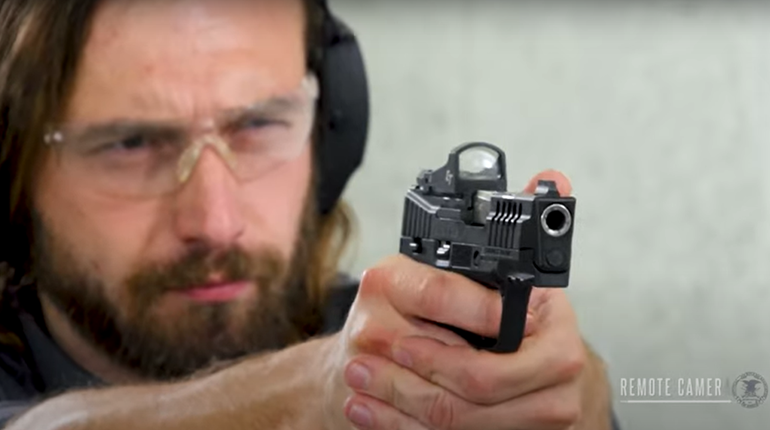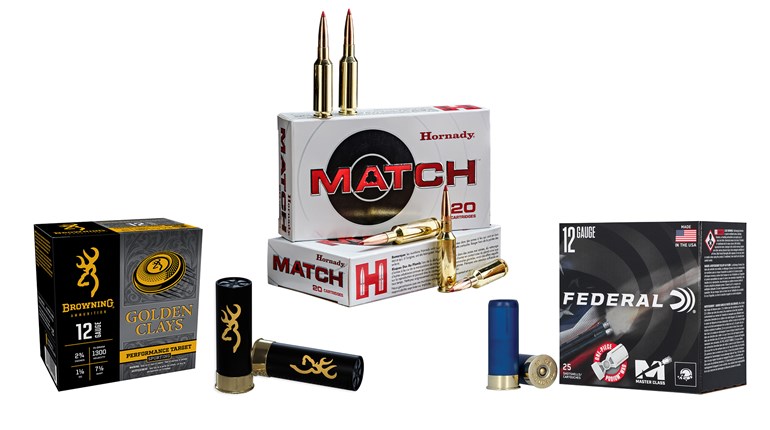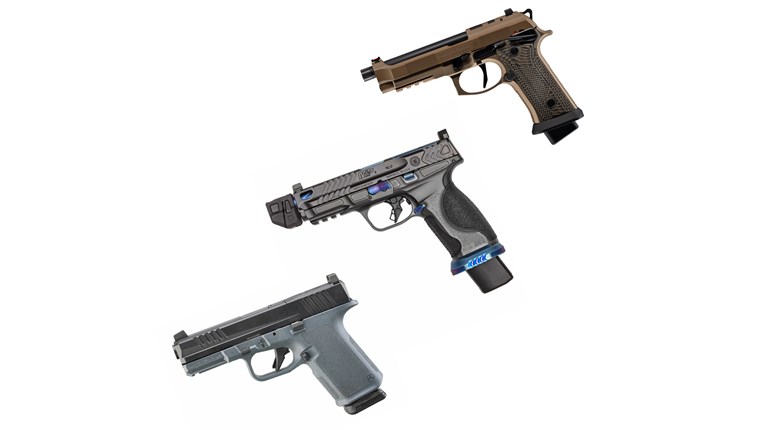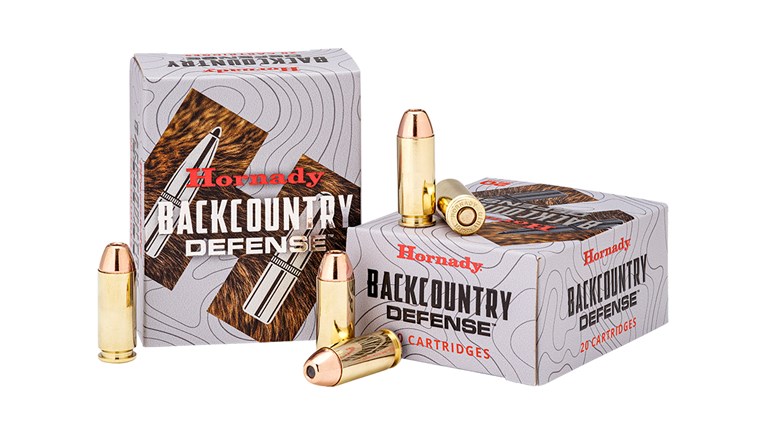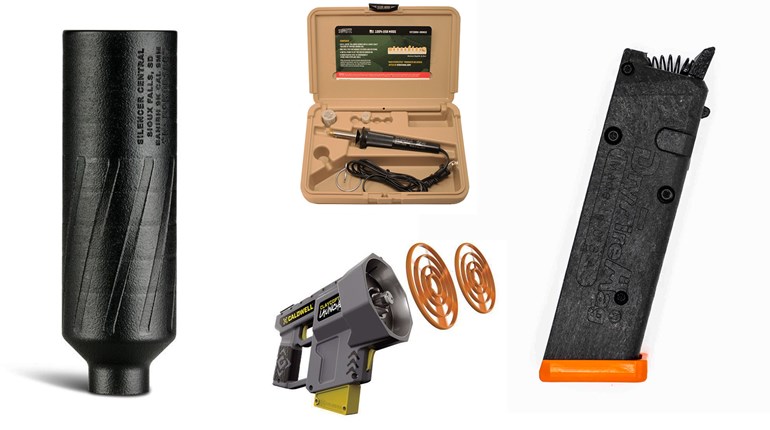
After an extended period without offering a pistol of any kind, Remington returned to the handgun market in a big way. Since 2010, “Big Green” has been churning out new handguns, including various models of the 1911-style R1, the compact R51 and the pocket-size RM380—with some notable missteps along the way. Until recently, however, Remington was still missing a staple of modern handguns: the full-size, polymer-frame, striker-fired 9 mm. Since the introduction of the Glock G17 in the 1980s, most of the major gun companies have been innovating by building upon this concept. As a result, the “Remington Polymer 9,” or RP9, enters a crowded market of similar pistols. So, the question becomes: How does the Remington RP9 compare to the competition?
At first glance, the Remington RP9 is pretty typical. The pistol has a striker-fired action with no external safety, other than the ubiquitous trigger-paddle safety. The RP9 is certainly nothing unusual at first glance. While polymer-framed guns are often described as ugly or lacking the soul of traditional steel-and-wood pistol designs, the Remington has a distinctly European look. The RP9 has smooth, rounded lines that remind me of a Walther PPQ. To my eye, the gun looks a bit top-heavy, with a blocky pyramidal top end, and a svelte grip frame. While opinions may differ on the Remington’s aesthetics, the Remington RP9 is definitely a recognizable and distinctive-looking pistol design.

Another differentiating factor with the Remington RP9 is its impressive 18+1-round capacity. The proprietary Remington magazines are slightly longer than typical 17-round magazines in similar guns, which explains the slight increase in capacity. While a single additional round may not seem like much, it does distinguish the RP9 from its competition. I also appreciate the slightly longer grip frame to accommodate my large hands.
Perhaps the most distinctive feature of the Remington RP9 is the pistol’s grip. If you can get past the slightly tacky Remington “R” emblazoned in the grip frame, the grip is impressive. This gun is intentionally designed to fit almost any hand. Small hands will appreciate the more rounded grip shape, which seems impossibly small for this full-size, double-stack handgun. Large hands will appreciate the lack of finger grooves—which never seem to fit anyone with bigger-than-average mitts—and the ability to install larger interchangeable backstraps. Each pistol comes with three backstraps, and almost every shooter should be able to find a good fit from those options. In fact, Remington claims the RP9’s grip will fit 95 percent of shooters, and I believe it.

Shooters with smaller hands, in particular, will be very pleased. Aftermarket gunsmiths have created a whole industry of grinding polymer off of pistol grip frames—but this gun won’t likely need any such work. After passing the Remington RP9 around while at the range, no one seemed to find the gun uncomfortable or ill-fitting, from the smallest woman I could find to the largest man. This is no small feat for a double-stack service pistol, and it makes me wonder how Remington made this grip feel so small.
The RP9 also has the advantage of being mostly ambidextrous. The magazine release is reversible for left-handed shooters and the only other external operating control—the slide-stop lever—is ambidextrous and can be operated from either side of the frame without any modification.
The three-white-dot fixed sights on the Remington RP9 are pretty typical, but the rear sight features a flat “fighting surface” to permit one-handed racking of the slide in an emergency. This can be accomplished with a belt, shoe or similar improvised surface. The factory sights are drift-adjustable in the dovetail, and easily replaced if white dots aren’t your preferred sight picture. They are more than adequate, but a variety of aftermarket sights will fill in the gaps for shooters who want night sights or other sighting systems.

Disassembly of the Remington RP9 is simple—after ensuring the gun is unloaded, employing a single takedown lever enables removal of the slide. From there, removal of the metal recoil guide rod, recoil spring and barrel is easy. Fieldstripping the pistol does require pulling the trigger, but that is pretty common for guns in this category. Use caution, follow the safety rules and this should never be a problem.
All in all, the design and features of the RP9 are quite impressive. Remington has included all the features required for a modern, striker-fired, polymer-frame pistol design. There is nothing particularly innovative, but there is really nothing missing either; a solid offering in a crowded market of similar pistols.
With any new pistol design like the Remington RP9, the first question must always be: Does it work? Over the course of several weeks and several range sessions, I put slightly more than 1,000 rounds through the RP9. To make the testing as thorough as possible, I shot a wide variety of factory ammunition, including 115-grain range loads, 115-grain hollow points, 124-grain hollow points, 124-grain +P hollow points and 147-grain hollow points, along with an assortment of 115-grain commercially reloaded ammo.
The Remington RP9 digested all of this ammo without a single hiccup. The reliability of the gun was pleasantly boring and made testing easy. During one range session the pistol digested more than 300 rounds in an hour, getting uncomfortably hot. Even with such high-volume shooting, there were no functional problems. In fact, the entire testing protocol was done with only a single quick cleaning right before accuracy testing.

The only functional issue noted was a tendency for the pistol to fail to chamber the very first round of a magazine unless the slide was worked vigorously with the “slingshot” method. Simply pressing the minimalist slide-stop lever to close the slide and chamber a round would not work with all types of ammunition. Most trainers would agree that the gross-motor movement of the slingshot method is a better gun-handling habit anyway, and the Remington’s slide-stop lever is a bit small to be reliable under stress. This is true of many modern pistols, but worth noting. With proper pistol technique, the slide-stop lever is rarely used under stress, so it is not a major concern.
Remington emphasizes the “shootability” of the Remington RP9. Frankly, I have always loved this term, but I was never convinced it was really a word. Now that Remington has used the term in its marketing materials, I feel like I can get on the bandwagon. The RP9 pistol rates high in shootability for a number of reasons. A major factor is the relatively small and ergonomic grip. The trigger guard is undercut for a higher grip, and the web of the hand is well protected from slide bite by a generous, integrated beavertail. From small hands to large hands, the Remington seems to fit many people well. A good fit makes achieving accurate hits easier and makes recoil softer and more manageable.
Despite its reasonably sized grip, the Remington RP9 as a whole is definitely on the large side, and carries plenty of weight in its beefy slide. The size and weight do help to dampen perceived recoil—even the hottest loads are pleasant and manageable in the RP9 handgun. While premium defense ammo can be “snappy” in this pistol, none of the rounds I tested could be described as unpleasant. Even the most recoil-sensitive shooters should have no problems with the RP9.
Shootability is also a function of the trigger mechanism. The Remington RP9 has a middle-of-the-road trigger for a striker-fired gun—not the best, but definitely not the worst. It’s not quite as “mushy” as a standard Glock trigger, nor is it as crisp as a fine aftermarket job. The trigger itself has a wide face and minimal overtravel. The reset is a bit long for my taste, but it can certainly be felt (and heard if you’re dry firing).
Assuming most people will use the Remington RP9 for personal defense, I focused my accuracy testing on self-defense ammunition. In particular, I was impressed with the Federal Personal Defense 124-grain +P JHP, and the SIG Sauer Elite Performance 124-grain V-Crown JHP. Both averaged faster than 1,200 fps, with impressive accuracy at 25 yards. The RP9’s performance at the range was quite exemplary.
While the Remington RP9 is high on the “shootability” scale compared with other pistols in its category, its “concealability” is a different issue. Nothing about the RP9 pistol is small, so carrying concealed is more difficult, though it is similar to other duty-size guns. For most people, that means belt carry with a cover garment of some kind. If you want to carry a full-size service pistol, you will have to dress around the gun.

The Remington RP9 has an MSRP of $489, which makes the pistol $50 to $100 cheaper than a comparable Glock, Smith & Wesson or Springfield Armory gun. Better yet, actual street prices can be considerably lower, with aggressive discounts and occasional factory rebates. At press time, reputable retailers were offering the RP9 handgun for less than $300 after rebates. While such prices may not be available all the time, the Remington is clearly going to be less expensive than most competing handguns.
Remington ships each pistol with two, 18-round, metal-body magazines and the usual accessories, including the obligatory cable lock. Given this price point, Remington packages the gun in a cardboard box as opposed to a lockable plastic box. This seems like an unnecessary concession to keeping production costs low, but it’s not unusual in today’s market.
So, how does the Remington RP9 compare to the competition? The quality and performance of the Remington is similar to all of its most obvious competitors. There are a few factors that favor the RP9—like the very accessible grip, and the larger 18-round magazines, but the Remington’s strongest appeal may be its very competitive price. With all other things being similar, the significantly lower price of the RP9 pistol is likely to be quite attractive to consumers. For price-conscious shoppers, a new Remington RP9 with a lifetime warranty may be priced comparably to used guns from other manufacturers. While not necessarily innovative in any particular way, the newest Remington offers an outstanding value in a good quality pistol from a historic company.














